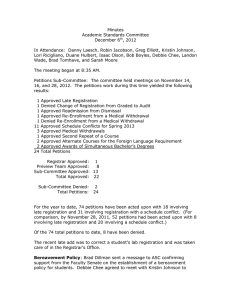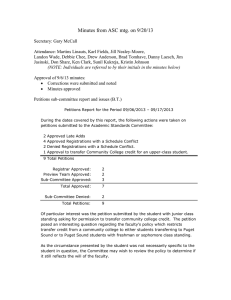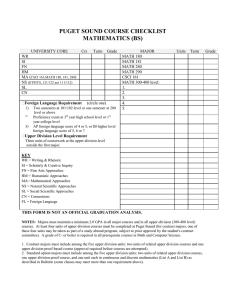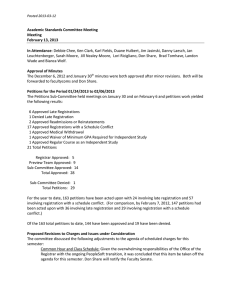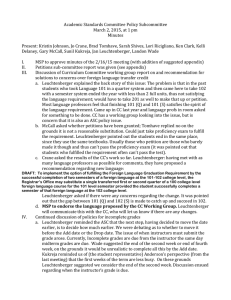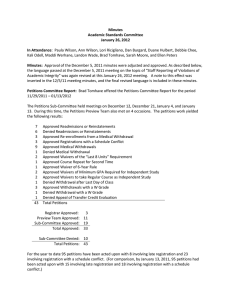Academic Standards Committee Meeting 21 October 2009
advertisement
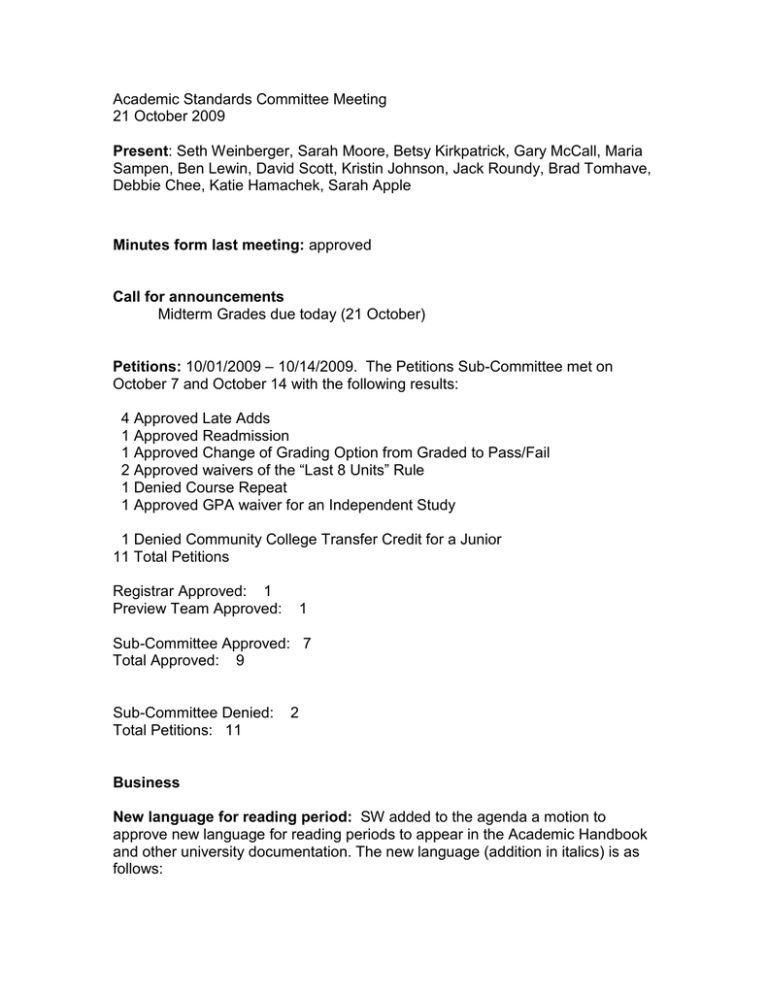
Academic Standards Committee Meeting 21 October 2009 Present: Seth Weinberger, Sarah Moore, Betsy Kirkpatrick, Gary McCall, Maria Sampen, Ben Lewin, David Scott, Kristin Johnson, Jack Roundy, Brad Tomhave, Debbie Chee, Katie Hamachek, Sarah Apple Minutes form last meeting: approved Call for announcements Midterm Grades due today (21 October) Petitions: 10/01/2009 – 10/14/2009. The Petitions Sub-Committee met on October 7 and October 14 with the following results: 4 Approved Late Adds 1 Approved Readmission 1 Approved Change of Grading Option from Graded to Pass/Fail 2 Approved waivers of the “Last 8 Units” Rule 1 Denied Course Repeat 1 Approved GPA waiver for an Independent Study 1 Denied Community College Transfer Credit for a Junior 11 Total Petitions Registrar Approved: 1 Preview Team Approved: 1 Sub-Committee Approved: 7 Total Approved: 9 Sub-Committee Denied: Total Petitions: 11 2 Business New language for reading period: SW added to the agenda a motion to approve new language for reading periods to appear in the Academic Handbook and other university documentation. The new language (addition in italics) is as follows: “The reading period is intended to provide students with time to reflect on their semester’s academic work and to prepare for final examinations. This time must be free from competing demands of class meetings, tests, deadlines for course work, and other activities. Optional review sessions in which new course material will not be introduced are allowed. Requests to waive this policy must be submitted in writing to the Dean of the University.” The motion was approved. Fulfilling upper division requirements with classes in department of major that do not count toward major: Motion made to approve new language for graduation requirements. After a brief discussion of the clarity of language, the motion to approve the proposed language was put to vote. Current Language: “Earn at least 3.00 academic units outside the first major at the upper-division level” Proposed Language: “Earn at least 3.00 academic units outside the department of first major and requirements of first major at the upper-division level.” The motion was approved. JR – Point of Information – Will the committee return to the issue of how this language affects interdisciplinary majors at another time? SW – No. This committee will not handle the issue; it will go to faculty. Changes to Pass/Fail grade option: SW outlined five possible options for revising the current P/F grading option that arose out of the faculty discussion last year. These included: 1) No P/F courses in department of first major 2) No P/F courses for freshman and sophomores 3) Permission of instructor required to take class P/F (either at course level or individual level) 4) Lowering number of P/F classes available 5) Raising grade required to “pass” After a brief review of the history of this issue for those people who are new to ASC this year, the committee discussed the possibility of enacting the above options. It was acknowledged that these are solutions to different problems and that we should have a clear understanding of the purpose and spirit of P/F. SW clarified that last year, the majority of faculty agreed that P/F is important for exploration outside of one’s primary area of study. While a formal vote was not taken, SW asked for objections to 1 & 2 listed above. The issue of whether #1 will apply to minors and all majors (as opposed to only first major) was raised. The committee agreed that the language should change to include all majors and minors. Regarding #2, the issue of sophomores who qualify as juniors was brought up. The committee agreed that using “unit count” would be the most efficient way to determine class standing in the context of P/F. Overall, there was wide agreement for adopting 1 & 2 listed above. There was little discussion about #3 (requiring permission of instructor). However there was concern that there are some upper-level courses that have no prerequisites. These classes may draw an excessive number of P/F students and “block” other students from taking the course for a grade. Allowing instructor approval may rectify this problem. Some faculty and student members of the committee, however, were worried that this option may create bias. Faculty may treat and evaluate P/F students differently than other students in the class. It was suggested that proposal #4, lowering the number of P/F classes be enacted. While there was general agreement that this was a good idea, the committee eventually determined that in order to make informed decisions about these options and align the rules to the behavior of the students, the committee would need to review data on P/F. BT said that he would bring data to the next meeting. The discussion of #5, raising the grade requirement (currently C-) to pass, was minimal. It was suggested that the C- floor is too low. This, however, brings up a contradiction in the purpose and spirit of P/F. If students use P/F to explore new disciplines, then raising the floor for passing may not allow students to “take risks” in new areas of study. Discussion tabled until next meeting when BT will bring data. Meeting adjourned Minutes taken by Ben Lewin
